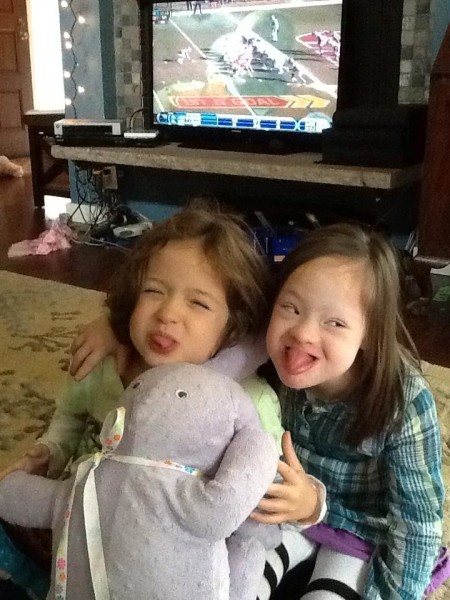*I have loved a couple great kids who had a Down Syndrome diagnosis. They have a special place in my heart. I’m glad to host Michelle and Amy’s thoughts on parenting a child with Down Syndrome as a way to celebrate Down Syndrome Awareness Month. These are kids worth celebrating.*
What was your first thought when you found out you had a child with Down Syndrome?
Michelle: Tullie was a 31 week preemie. We found out about her Down Syndrome (DS) diagnosis at birth. Our 20 week ultrasound showed no indication of DS and her early birth and her diagnosis were a surprise to us. My husband had gone up to the NICU (Neonatal ICU) with her after her delivery and while the nurses were looking her over and checking her out they saw the physical signs of DS-almond shaped eyes, flat nose, space between their big toe and the next, a straight line across the palm of her hand and low muscle tone.
Mike, my husband, came back to my room and asked a nurse to leave. I could tell he had been crying. He was trying to hold it together when he told me that the nurses believed that our daughter had DS. They told us that they’d do the genetic testing, but they were pretty certain that she did, in fact, have DS. When Mike told me my initial thought was, “She is NEVER going to leave the house.” Albeit, a selfish one, but that was my first thought.
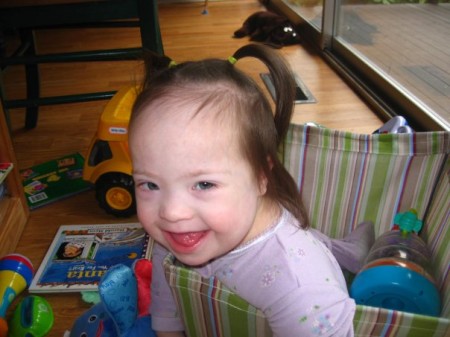 There are many people I’ve talked to over the years who have said that they were just fine with their child’s diagnosis and I really don’t believe them. It’s too much of a life changer. It’s unexpected and it’s hard. My first thought, is a thought that I still have often, especially on a hard day. It creeps up and it pulls be down when I already feel kicked.
There are many people I’ve talked to over the years who have said that they were just fine with their child’s diagnosis and I really don’t believe them. It’s too much of a life changer. It’s unexpected and it’s hard. My first thought, is a thought that I still have often, especially on a hard day. It creeps up and it pulls be down when I already feel kicked.
Those first days and weeks with Tullie are a blur. I remember feeling so overwhelmed and trying hard to act like I had it all together when really I had to allow myself to grieve and to love her. The first year was really a struggle of “saving face”. Do I say what I really think or say what everyone wants to hear?
Amy: My case was unique in that the pregnancy started as a spontaneous triplet pregnancy. At my 12 wk US it was discovered that the twins had passed away and the third baby had a thickened nuchal fold (the skin at the nape of the neck) just slightly out of normal range. I was given a high risk assessment and offered a blood panel, but the fact it was a multiple pregnancy could throw the results. Or an invasive procedure, CVS. Given that odds were high I’d lose the pregnancy anyway, we declined. My mind was clouded with grief and fear of losing our remaining baby, chromosomes didn’t really rank much in light of that. Besides, the probability of Down Syndrome seemed remote considering how much we had been already through. At 17 wks we were given a detailed anatomical ultrasound scan. Baby Girl #6 looked good to my untrained eye. The sonographer was pleasant and at ease. When she left the room, Jason and I felt confident we had dodged the bullet and gave each other relieved smiles. We then sat in a exam room and waited for an hour. It was snowing heavily in Seattle, so we assumed that was reason for the delay. But as time dragged on our tension grew. Two female doctors entered, one asking me to move away from my husband (sit on the exam table) and she took my spot next to him. It was odd. As the OB signed in the computer, my eyes strained to decipher a long handwritten list on the US report. I could make out ‘cord issues’, ‘possible bowel obstruction’ and a bunch of words I’d never needed to understand, but could soon hold life or death for my littlest girl. The OB was so very very sorry to tell us that, (long sighhhh, hand on my arm) our baby had several ‘markers’ that are consistent with what they see in babies with a trisomy defect, most likely Down Syndrome. She was so sorry. So sorry. Sigh. She exuded despair. A death sentence. She told us that many terminate these kinds of pregnancies. I gave her a shocked and sad smile and told her ‘it was okay’, as if to reassure her. I looked over to my sober faced husband. Maybe he would say something clever to make this all go away. He was stunned. ‘If I wanted an abortion, I needed to decide soon. We were nearly past the time. They could set up an amnio in 15 minutes.’ ‘I would only have a few more weeks to change my mind.’ Another tense smile and I heard myself say yes, I wanted to continue. The doctor next to my husband started to clarify something, and it became clear she was there to mediate between Jason and I, lest we not be in agreement on that issue. Normally, we would be immediately referred to the in house geneticist but she’d gone home early on account of the bad weather. We’d have to come back in three days. Did I have any questions? I asked if these issues she had could resolve, and they could, some of them, but that wouldn’t change the probability of a chromosomal defect. So technically we had an ‘unconfirmed prenatal diagnosis’. When we met with the geneticist, she was much more positive than I expected. I think realistic would be the word I would use to describe her. She knew we were pro-life, it was on file. Her first question took me back “how can I help you?” (‘tell me she is FINE!’ echoed inside my head) Instead we asked for the numbers. We had sooo many markers, like 5 all together, that we were in this remarkable group of 0.decimal percentages. I think it was a 0.66% odds that she didn’t have a trisomy defect. So, it was lots of very scary baby steps that led us to accept that she had DS, with very complex emotions. But mainly my first concern was that she would die, we were told she could ‘check out’ at any point, no matter how well things seemed to be going. It was hellish. I felt like a walking graveyard.
How did you make peace with the diagnosis?
Michelle: Tullie was on oxygen for the first 10 months of her life 24/7. She continued to stay on it until she was three years old for naps and sleeping at night. But her first several months were critical to her health. During the fall and winter months (she was born in June), we kept her and our oldest son home from church. Our church at the time had 3 services, and Mike and I would decide who would go in the morning and who would go at night, and then the other would stay home with the kids. Even though Tullie was with us during church there was still a risk of our older son catching a cold or some sort of bug in the nursery, bringing it home and then Tullie would catch it possibly sending her to the hospital. Anyway, one morning I walked into church and immediately saw a dear friend. She asked me how I was doing and I lost it. I really lost it. It was “ugly cry” right there in the church foyer. She kindly took me by the arm and led me upstairs to one of the pastor’s offices. I wept. I broke down and everything from the last several months fell out of me. She said something to me that morning that helped a lot. She said, “Sometimes we have to say the ugly thoughts that we don’t want to say and not hold them inside, because when we’re trying to be strong, and holding them inside, it’s causing us more harm than good. Once it’s out, it’s out. There’s no turning back and it usually feels better once it’s fallen off of your lips.” We sat there through the whole service talking. I was vomiting my feelings for most of it, but she sat there and listened and gently cleaned me up with words of encouragement and love. Then as I was walking back to the car, I ran into some friends who asked where my husband was and how Tullie was doing, and once they learned that we were taking turns at home, they took it upon themselves to watch our kids every week so that Mike and I could go to church together. I then went home and told Mike the “ugly things” that were in my heart and we had a great honest talk of what we had been feeling for months about our new little girl. I will forever be grateful to those friends. They helped us through a really tough time for us.
I guess my point is that coming to peace or more like “acceptance”, is vital to survival. When I spoke with my friend, I hadn’t accepted anything about Tullie. All I saw at that point was a ton of work and a bleak future. When we talked though, it was a turning point for me. A small turn, but a turning point. I felt like we’d be okay. Things were going to be hard and sometimes scary, but we’d make it.
Amy: I didn’t. It sunk in, I accepted it. I knew it was her best hope (the only non fatal trisomy defect). I was afraid she’d suffer or die. I was being asked to do something that was beyond my grasp. I felt unprepared and unequipped and I was. My faith was being painfully stretched. My husband was amazing, patient, sympathetic, encouraging, ever hopeful. He was a pretty perfect compliment to me, which were skills he’s learned walking through many hard things together. But I still couldn’t find his ‘peace’. A side note, when my mom was my age, 37, and I was sixteen, she was expecting my baby brother, Riley. I had always longed for a younger sibling. Maybe obsessively longed? Yes. 😉 She was about 5 months along when I came home from school and she was excitedly waving a piece of paper with squiggly lines on it. “IT”S A BOY!” Confused, I asked her what the paper was. She’d had an amnio, because she was older and the risks of Down Syndrome. Naive, I assumed they were screening for DS so they could help heal the baby. But I’d felt my baby brother move. I was counting down days. They would kill him if he was broken?! This was the first fatal blow to the pro-choice ideology I had been raised on. The Lord often brought this scenario to mind to remind me that I wasn’t being subjective in my grief. No, I never wanted an abortion, ever. But I struggled to embrace that this baby, that this reality was for my best and His glory. I couldn’t see it. I didn’t lack the faith that Jesus would work this all out. But experience made me ask, “how painful will this be?” I remember crying, to Jason, 38 wks, in the bathtub, “but. I. Don’t. Want. To. Be. Her. Mother.” Saying those words was heart rending, saaad and freeing. I could feel the bonds of despair loosen as I leaned on the Lord like a weaned child. His grace came in like a tsunami. I share that humiliating story because people assume things about me for ‘choosing’ to be Evy’s mom that just aren’t true. I’ve been called an angel, a saint, so patient, ect, ad nauseum, sadly, I am a mere mortal. It’s disappointing, isn’t it?
Jeremiah 17:9
9 “The heart is deceitful above all things,
And desperately wicked;
Who can know it?
My heart. This is where I found my first shred of compassion toward the 94%, who don’t choose life for their broken baby. Our hearts lie to us. Even MINE and I knew better. Let me be clear, I wanted my baby any which way she came. I still had the faith that God would work this all our for our good but I couldn’t SEE how. It was a dark and lonely time.I never prayed her away but the pain of it all, the fears, the loss of the twins, the uncertainty, the strain on my nine other kids and marriage in the middle of a move was hard.
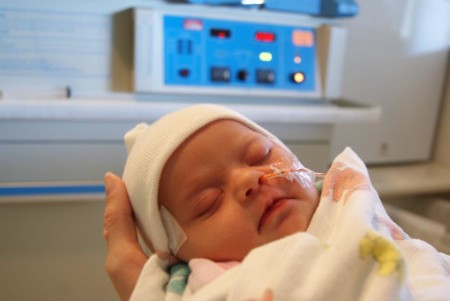 When she was born, and we knew she had a 99.3% probability of having DS, they lifted her up between my legs, I saw her little almond shaped eyes, her stick her tongue way out and I fell in love with my. beautiful. baby. The whole world stopped and I loved her. And I wanted her. This exact baby. And I knew. I looked at J and he nodded, smiled and it was okay. She struggled a little, so the OB told me they were wanting to watch her in the Nicu and gave a visual dx of DS. We didn’t cry. We weren’t sad. I just wanted to hold and love my baby. The Lord gave us the grace when it was needed and not a second sooner.
When she was born, and we knew she had a 99.3% probability of having DS, they lifted her up between my legs, I saw her little almond shaped eyes, her stick her tongue way out and I fell in love with my. beautiful. baby. The whole world stopped and I loved her. And I wanted her. This exact baby. And I knew. I looked at J and he nodded, smiled and it was okay. She struggled a little, so the OB told me they were wanting to watch her in the Nicu and gave a visual dx of DS. We didn’t cry. We weren’t sad. I just wanted to hold and love my baby. The Lord gave us the grace when it was needed and not a second sooner.
In hindsight, I am thankful for the prenatal diagnosis. I am glad that I grieved and she was met with nothing but our love and joy.
How is your life different from the life of a family without a DS child?
Michelle: There are so many times in which I wanted my life to be the same as any other family that walks down the street, but I’ve learned over the years that all of the families that walk down the street are different.
Tullie’s health is amazing for a child with DS. We had some struggles with oxygen early on in her life and one surgery, but for the most part, we haven’t had to struggle medically with her much at all. A lot of our other friends have, especially when their children were younger. I’m more then grateful for our daughter’s health.
We don’t put a lot of focus on her disability. We understand and know that things are going to be more difficult for her and that she is going to have to try harder at everything. She’s smart and quick, but she has to work harder than the rest of our children to really remember, understand and grasp information. She causes all of us to slow down in explanations and discussions.
I feel like my other children treat her as one of the crew. They don’t treat her any differently than their other siblings, and I think in turn their friends don’t treat her any differently, because she’s one of the crew.
We’ve made a really big deal of our boys looking out for the girls, especially protecting them when they are playing with other friends and instilling in them a sense of urgency of respecting their sisters, loving and protecting them. I think that our oldest son has really taken on the task of loving Tullie and serving her when she’s needed help with friends or protection. For example, when the kids were going to public school Josiah and Tullie were at the same recess in the morning. Josiah and his friend would find Tullie every morning to “check in” with her. I never asked him to do that. He took it upon himself as a way of protecting her and loving her. I asked him once about it and he said, “Yea, I just wanna make sure she’s okay. Sometimes she just waves and sometimes she follows us and tries to play with us, and that’s okay too.” That warmed my heart. That every day he was looking out for her like that. He still does even with little mentions of wanting her to live with him when they’re older.
For a long time after Tullie’s birth I had a hard time with “feeling” like we were too different. We had several friends who supported us, but we also had a lot of friends who were having children at the same time. All of the kids were typical kids, and I struggled with a lot with jealousy. I wanted that for me and my family. I didn’t want to struggle. I didn’t want the hindrance of a child with special needs to pull me into a place that I wasn’t ready for. I didn’t want to be looked at differently because we had someone different in our family. I wanted the freedom to go where we wanted to go and not to have to extra doctor’s appointments or be near specific doctors. I just wanted to BE and not get noticed.
Over time, I feel like I’ve been able to see that we’re really not that different from others. That a lot of my jealousy and “looks” that I struggled with were mostly in my mind and wanting to be accepted by man and not thinking about what Jesus thought of my daughter or me. It was simply sin on my part, because I was looking at the view of man and not of Jesus, the One who created her.
Amy: We use words we didn’t need to know with our nine older kids. Our radar is always on for the complications. We make different medical decisions than we did for our others, who have healthy functioning systems (like vaccinations and antibiotics). We are learning sign language. We have therapists in our home regularly. There is a tension of the unknown, the frustration of elusive milestones. The sensitivity of a fresh wound. The humility required to answer questions that I don’t know the answers to. A defensiveness lest that lady at the grocery store say something unknowingly insults my baby or that undoes me. But there is a preciousness of entering into her joy. Yesterday my 10 year old excitedly told me about seeing 16mo Evy get up on her hands and knees. Something that really wouldn’t rate with a typical kid. My kids love and care for her with a tender care that is different than their other siblings.
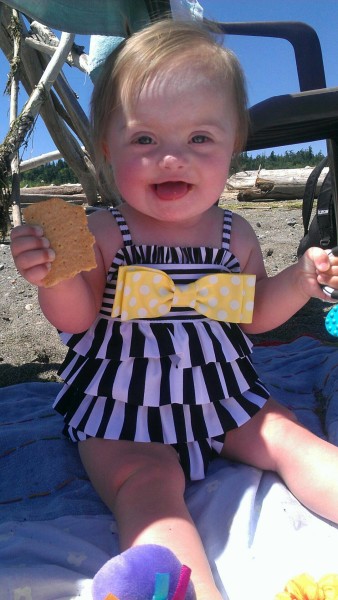 Outside of our home, one of the chief differences is that Evy gets a LOT of attention from strangers, vastly positive, everywhere we go. This still surprises me and was very different than how I imagined her being received. Babies with Down Syndrome are seen as cute and unique. Like puppies. (oops, my cynicism is showing). Maybe I underestimate people. It just seems like with the huge prenatal termination rate (no one really wants one for themselves) and the way adults with disabilities are treated leads me to the puppy idea. I hope I am wrong. I usually, delightfully, have been wrong with most of my preconceptions about Down Syndrome.
Outside of our home, one of the chief differences is that Evy gets a LOT of attention from strangers, vastly positive, everywhere we go. This still surprises me and was very different than how I imagined her being received. Babies with Down Syndrome are seen as cute and unique. Like puppies. (oops, my cynicism is showing). Maybe I underestimate people. It just seems like with the huge prenatal termination rate (no one really wants one for themselves) and the way adults with disabilities are treated leads me to the puppy idea. I hope I am wrong. I usually, delightfully, have been wrong with most of my preconceptions about Down Syndrome.
What are your hopes for your child with DS?
Michelle: We hope that Tullie will be independent. We hope she’ll be able to get a good job. She’s really high functioning and she loves to organize things. You can’t walk down an aisle at Target without the kid fixing a messed up display. It makes for long Target trips and then I notice too many other things to purchase. 😉 In all seriousness, we feel like she does have a bright future. We hope that she’s able to read and write well and that she’s able to speak clearly. All of those things will help her get a good job and hopefully one where she’s able to have a good amount of responsibility that is more than just taking out trash.
I hope that she falls in love and I hope that if she does, that person will love and respect her for who she is and value her. I hope that the people whom she comes in contact with will see her and not see her disability. I hope that she’ll be able to have friends who value her and love her.
Mostly, it’s my prayer that she’ll know Jesus. That it’ll be true. That it’ll be real. It’ll be her heart and her life. I pray that people will see Jesus in her and His love for her. I pray she’ll be compassionate, because He loves her and that she’ll understand that.
Amy: I hope and pray that Evy will be loved and appreciated, her whole life. That she will be valued for intrinsic worth as a child of God and not on her abilities or lack of them. I really hope she can communicate and read. I would love for her to understand and enjoy the Gospel. I would like for her to contribute to our world in some way, like service or volunteering. I hope she can help her siblings in their homes, helping with household chores and children and that she would find satisfaction in that. I seek to learn how God has equipped and gifted her and want to enable her to put that to highest use, just like I desire to do for her siblings.
What are your fears?
Michelle: Tullie has a lot of disadvantages, and as parents of a child with special needs, it would be foolish of us to blow them off. We need to be aware of the dangers that are in this world, but also be aware that she is more susceptible to them. We’re afraid that people would take advantage of her, either talking her into something or abuse. We’re very careful of the people who watch not only her but all of our children. We take it very seriously. Maybe more than others, but it’s something that’s important to us. We want her to learn early to be careful. To protect herself, but also her siblings to help and to stand up for her if she is unable to defend herself for some reason and be clear with her words.
I mentioned earlier that we would like her to fall in love and share her life with someone, but there also comes a concern of children. For Tullie to have children is a big deal. It’s not an easy decision and it’s certainly not one to take lightly. We’re hoping that she’ll recognize her limitations, and respect them, but also not limit herself to other possibilities in life.
She’s more prone to health issues because of her low tone. Her being on oxygen at a young age for so long, and being at a higher risk for leukemia. There are a lot of things with the new healthcare stuff that’s rolling out that I get concerned that she may not be a “valued asset to society” and her care would be limited and her life not as valued. I struggled with it for a while, and I had to come to terms that she was not my child, but Jesus’. He was in control of her life. He knows the number of her days. I need to trust Him with her and whatever life may bring.
Our first goal as parents is to protect our children. I hope that we’re able to do that. I hope that she is safe. I hope that she remains safe and that we’ll be able to teach her how to protect herself.
Amy: Pain, disease. Her being unprotected, scared or afraid. Children with intellectual disabilities have a 4 times greater risk of sexual abuse. Disabled girls, even higher. Kids with DS have a much higher rate of Leukemia with a lower survivability. I fear I will treat her different in a way that might seem good for her but not really be good for her. She’ll need to know boundaries and discipline. Viewing her as a ‘wounded duck’ won’t help her or anyone else. I worry that she or I or any Lewis might find our identity in Down Syndrome or Special Needs (or home schoolers, or reformed, or big family or fabulous or awful or ..) versus finding our identity in Christ alone. 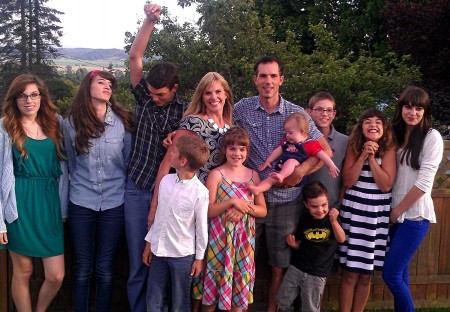
What has your child with DS taught you?
Michelle: Tullie has taught us patience. In everything that she has done, she has taught us patience. She was born nine weeks early. We spent six weeks in the NICU with her. Each day was a new lesson in patience. When was she going to take her feedings by herself? Was she ever going to breathe alone without oxygen? Could she maintain her own body temperature? Any child that is born prematurely is going to teach parents patience whether they have DS or not. All of our children, typical or not teach us patience. I think though that Tullie has taught us to move slower. Everything with Tullie is slower. She started sitting up independently when she was 11 months old. She didn’t start crawling until she was 16 months. She didn’t start walking until she was 3. I’ve felt like much of our life with her is relaxing and letting her grow. Pushing her to the next step so that our “plateau” times don’t last that long. It’s always been waiting. We know with confidence that she WILL achieve the task and do it well, but she’ll do it on her own time.
I’ve struggled with comparing her to other kids. Especially when she was a baby and we had a lot of babies who were born around the same time at church. Their children were meeting milestones on target, mine was not. Sometimes skipping them all together. People would ask, “When do you think she’s going to walk?” I’d honestly say, “I don’t know.” Sometimes wondering if she ever would, but the big lesson was patience. Waiting with a happy heart. Helping her along. Not complaining. Waiting. Being content in her and who she was and in her ability. It’s something I’m going to keep learning over and over and over. Now we’re learning patience in writing and reading and counting. Next we’ll probably be learning patience in whatever come next.
Amy: I see the people with disabilities that I just didn’t see before. I try to catch their eye and smile a knowing smile that says “I see you. You matter. I am happy you are here.” Before, I avoided, ignored and felt only my discomfort.
(The conclusion of this post can be found here.)

